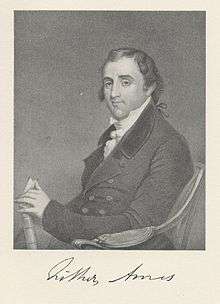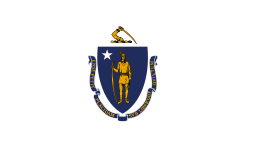Fisher Ames
Fisher Ames (/eɪmz/; April 9, 1758 – July 4, 1808) was a Representative in the United States Congress from the 1st Congressional District of Massachusetts. He was an important leader of the Federalist Party in the House, and was noted for his oratorical skill.
Fisher Ames | |
|---|---|
 | |
| Member of the U.S. House of Representatives from Massachusetts | |
| In office March 4, 1789 – March 3, 1797 | |
| Preceded by | 1st District created in 1789 8th District reissued in 1795 |
| Succeeded by | Theodore Sedgwick (1st) Harrison Gray Otis (8th) |
| Constituency | 1st district (1789–95) 8th district (1795–97) |
| Member of the Massachusetts House of Representatives | |
| In office 1788 | |
| Personal details | |
| Born | April 9, 1758 Dedham, Massachusetts Bay |
| Died | July 4, 1808 (aged 50) Dedham, Massachusetts |
| Resting place | Old First Parish Cemetery, Dedham, Massachusetts |
| Political party | Federalist |
| Alma mater | Harvard University |
| Profession | Lawyer |
| Part of a series on |
| Dedham, Massachusetts |
|---|
 |
| History |
| People |
|
| Places |
| Organizations |
| Businesses |
| Education |
Life and political career
Ames was born in Dedham, Massachusetts. His father, Dr. Nathaniel Ames, died when Fisher was but six years old, but his mother, Susannah Howard resolved, in spite of her limited income, to give the boy a classical education. He had a brother, also named Nathaniel Ames. At the age of six he began the study of Latin, and at the age of twelve, he was sent to Harvard College, graduating in 1774 when he began work as a teacher. While teaching school Ames also studied law. He was admitted to the bar, and commenced practice in Dedham in 1781.
In 1788, he served in the Massachusetts House of Representatives. He became a member of the Massachusetts convention that ratified the United States Constitution that same year. Ames supported calling Joshua Bates as minister of the First Church and Parish in Dedham, but later left that church and became an Episcopalian.[1]
Ames was elected to the First United States Congress, having beaten Samuel Adams for the post.[2] He also served in the Second and Third Congresses and as a Federalist to the Fourth Congress. He served in Congress from March 4, 1789 to March 3, 1797. During the First Congress, he was chairman of the Committee on Elections. He was elected a Fellow of the American Academy of Arts and Sciences in 1793.[3] In 1796, he was not a candidate for renomination but resumed the practice of law in Dedham. He stayed in politics and was a member of the Governor's Council from 1798 to 1800. In his new role, Ames offered one of the great orations on the death of President Washington. He also published a number of essays, critical of Jefferson's followers. He was a member of the Federalist Party, specifically its Essex Junto.
In 1805, Ames was chosen president of Harvard University. He declined to serve because of failing health.[4] Four years later, in 1808, he died in Dedham on July 4. He was interred in the Old Village Avenue Cemetery after a public funeral in Boston.
Despite his limited number of years in public service, Fisher Ames ranks as one of the more influential figures of his era. Ames led Federalist ranks in the House of Representatives. His acceptance of the Bill of Rights garnered support in Massachusetts for the new Constitution. His greatest fame however may have come as an orator, for which one historian has dubbed him "the most eloquent of the Federalists."[5] Ames offered one of the first great speeches in American Congressional history when he spoke in favor of the Jay Treaty. Despite his Federalist sympathies, Ames would dissent from his party when he felt it was not in the country's best interest. For example, in 1789 Ames argued against the appointment of Thomas Willing as the President of Hamilton's newly created Bank of the United States.[6]
Ames became concerned by the rising popularity of Jefferson's Republicans, who advocated the United States adopt Republican type representative government along the lines of post-Revolution government in France. Hamilton's Federalists (of which Ames was one), although they too agreed with a Republic, advocated a stronger federal government with similar powers to the British example. Ames felt Federalism around a clear and firm constitution was the model the United States should follow to prevent the fledgling nation from failing. He cautioned against the excesses of democracy unfettered by morals and reason: "Popular reason does not always know how to act right, nor does it always act right when it knows."[7] He also felt that democracy alone was too fragile a system to resist descent into tyranny. "A democracy cannot last. Its nature ordains that its next change should be into a military despotism....The reason is that the tyranny of what is called the people, and that by the sword, both operate alike to debase and corrupt, til there are neither men left with the spirit to desire liberty, nor morals with the power to sustain justice. Like the burning pestilence that destroys the human body, nothing can subsist by its dissolution but vermin."[8] Likewise, Ames warned his countrymen of the dangers of flattering demagogues, who incite dis-union and lead their country into bondage: "Our country is too big for union, too sordid for patriotism, too democratic for liberty. What is to become of it, He who made it best knows. Its vice will govern it, by practising upon its folly. This is ordained for democracies."[9]
Notable quotes
- "We have but a slender hold of our virtues; they ought, therefore, to be cherished with care, and practised with diligence."
- "He who holds parley with vice and dishonor, is sure to become their slave and victim."
- "The heart is more than half corrupted, that does not burn with indignation at the slightest attempt to seduce it."
Legacy
He is the namesake of Ames Christian University.[10]
See also
References
- Smith 1936, p. 77.
- Dedham 1635-1890, Robert B. Hanson, p. 169
- "Book of Members, 1780-2010: Chapter A" (PDF). American Academy of Arts and Sciences. Retrieved 17 April 2011.
- Fisher Ames to Eliphalet Pearson, January 6, 1806 in W.B. Allen, ed., Works of Fisher Ames As Published by Seth Ames, 1983 ed., vol. II (Indianapolis: LibertyClassics, 1983), pp. 1490-92.
- Kirk, Russell. The Conservative Mind: From Burke to Eliot. Washington D.C.: Regnery Publishing, Inc., 2001. p. 81
- F. Ames to A. Hamilton (Jul. 31, 1791), in Syrett and Cooke, eds., 8 Papers of Alexander Hamilton 589-590 (New York, 1965)
- Kirk, Russell. The Conservative Mind: From Burke to Eliot. Washington D.C.: Regnery Publishing, Inc., 2001. p. 83
- Adams, Henry. History of the United States of America During the Administrations of Thomas Jefferson. New York, NY: The Library of America, 1986.
- Fisher Ames, letter of October 26, 1803, Works, p. 483. As cited in Kirk, Russell. The Conservative Mind: From Burke to Eliot. Washington D.C.: Regnery Publishing, Inc., 2001. p. 83
- "AMES Christian University proudly takes its name from Fisher Ames, one of America's "forgotten founding fathers," and a historical proponent of the Bible as the source of all wisdom". Ames Christian University. Retrieved February 4, 2018.
Works cited
- Smith, Frank (1936). A History of Dedham, Massachusetts. Transcript Press, Incorporated. Retrieved July 18, 2019.
Further reading
- Arkin, Marc M. "Regionalism and the Religion Clauses: The Contribution of Fisher Ames." Buffalo Law Review 47 (1999): 763+.
- Bernhard, Winfred E.A. Fisher Ames: Federalist and Statesman, 1758-1808. Chapel Hill: University of North Carolina Press, 1965.
- Douglass, Elisha P. "Fisher Ames, Spokesman for New England Federalism." Proceedings of the American Philosophical Society 103.5 (1959): 693-715. in JSTOR
- Farrell, James M. "Fisher Ames and political judgment: Reason, passion, and vehement style in the Jay treaty speech." Quarterly Journal of Speech 76.4 (1990): 415-434.
- Dictionary of American Biography (1934): Ames, Fisher
Primary sources
- Works of Fisher Ames: With a Selection from His Speeches and Correspondence. Edited by Seth Ames. 2 vols. 1854.
- United States Congress. "Fisher Ames (id: A000174)". Biographical Directory of the United States Congress.
External links

| U.S. House of Representatives | ||
|---|---|---|
| New district | Member of the U.S. House of Representatives from Massachusetts's 1st congressional district March 4, 1789 – March 4, 1795 alongside on a General ticket (1793-1795): Samuel Dexter, Benjamin Goodhue, Samuel Holten |
Succeeded by Theodore Sedgwick |
| New district | Member of the U.S. House of Representatives from Massachusetts's 8th congressional district March 4, 1795 – March 4, 1797 |
Succeeded by Harrison Gray Otis |

